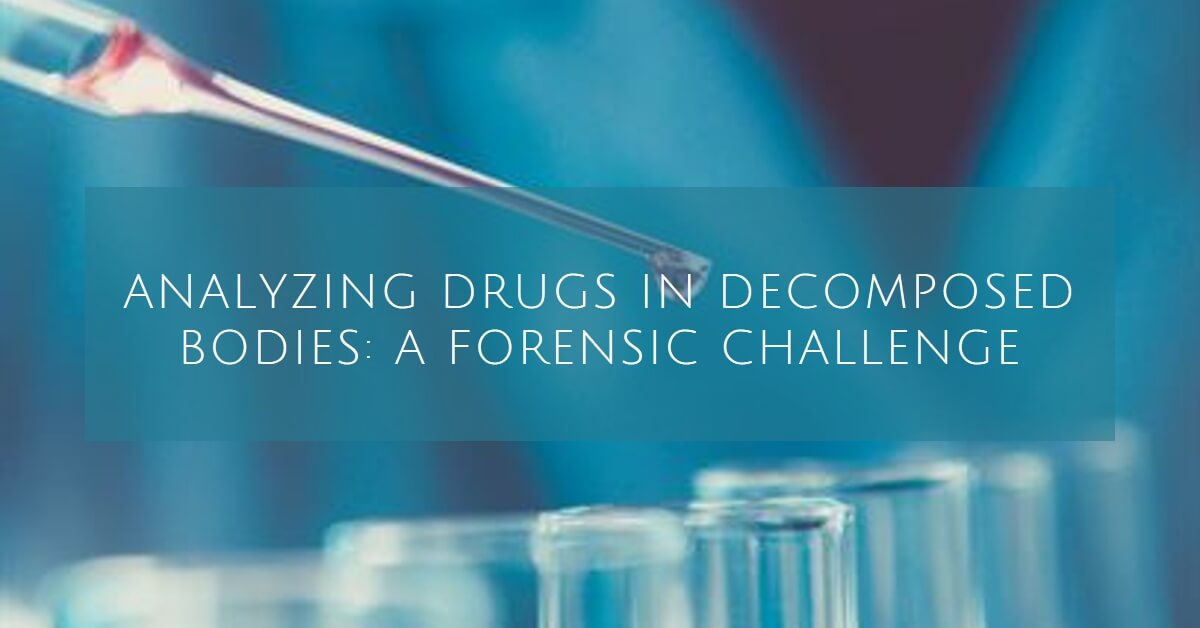Forensic science is like a detective for the departed, and one of its toughest puzzles is figuring out drug use in decomposed bodies. As bodies break down after death, forensic experts face a tough challenge in analyzing drugs that might be present. Imagine a fading melody of life and the whispers of drug use lingering in the silence of decay.
Understanding this challenge starts with knowing how bodies change during decomposition. It’s like nature taking back its own – tissues crumble, cells disappear, and the body transforms. Forensic scientists must act quickly, balancing the urgency of their work with the need to keep evidence intact.
Decomposition adds layers of difficulty to drug analysis. Tissues degrade, making it hard to find good samples. Drugs move around the body after death, making it tricky to know their original levels. Microbes join the mix, adding another layer of complexity.
This article takes you into the world of forensic science, where investigators face these challenges head-on. We’ll explore how tissue breakdown, drug movements, and microbial activity create hurdles. But fear not – forensic experts use clever techniques and tools to navigate this tricky terrain. Join us as we uncover the secrets of drug analysis in decomposed bodies, where science meets the mysteries of life and death.
What is Decomposition?
Decomposition is a constantly changing process that occurs when tissues and organic substances break down after death. The speed and manner in which decomposition occurs are greatly affected by factors like temperature, humidity, and the surrounding environment. As the body goes through these changes, it becomes more difficult to analyze drugs because the tissues and fluids degrade over time.
Challenges in Drug Analysis in Decomposed Bodies
1. Environmental Factors
The way a body decomposes can greatly affect drug analysis. Factors like temperature, humidity, and exposure to the elements can speed up or slow down the decomposition process. When the environment is extreme, it can cause tissues to degrade quickly, which can impact the stability of drugs and their byproducts.
This means that forensic scientists need to take into account the environmental conditions when interpreting drug concentrations. The varying rates of decomposition can add extra complexities to the analysis.
2. Ante-Mortem Drug Interactions
Before passing away, people might have been given several medications or may have used drugs. The interactions between drugs that occurred before death can make it difficult to identify and measure specific substances in samples taken after death. Additionally, the decomposition process can alter drugs and their byproducts, making it even more challenging to accurately determine the original drug profile.
3. Lack of Standardization
The lack of standardized procedures for drug analysis in decomposed bodies presents a major hurdle in forensic toxicology. Differences in protocols among various forensic labs can result in inconsistencies in findings and interpretations. It is essential to establish universally accepted guidelines for post-mortem drug analysis to guarantee consistency and dependability in forensic investigations.
4. Interpretation of Trace Amounts
In the case of decomposed bodies, drugs can be found in very small quantities. Analyzing these tiny levels requires a great deal of sensitivity in analytical techniques. Differentiating between post-mortem contaminants, artifacts, and actual drug presence becomes complex, requiring advanced analytical methods to extract valuable information from the data noise.
5. Incomplete Knowledge of Decomposition
Despite the progress made in forensic science, there is still much we don’t know about the complexities of decomposition. The rate at which decomposition occurs can vary greatly between individuals and under different circumstances, making it difficult to accurately predict the extent of post-mortem changes.
Forensic scientists must constantly stay updated with the latest findings in decomposition studies to adapt and improve their understanding.
6. Legal and Ethical Considerations
The complexities surrounding drug analysis in decomposed bodies involve both legal and ethical aspects. It is crucial to follow strict chain-of-custody protocols, show respect towards the deceased and their families, and guarantee the accuracy of findings for legal purposes.
Forensic experts face the challenge of balancing scientific rigor with ethical responsibilities, which further complicates the task of drug analysis in decomposed bodies.
Conclusion
Analyzing drugs in decomposed bodies is a difficult task for forensic scientists, as it requires a combination of different disciplines. The accuracy and reliability of drug analysis in post-mortem investigations have significantly improved thanks to advancements in sampling methods, analytical techniques, and technology.
With the continuous evolution of forensic science, we are now better equipped to understand the intricate details of drug-related deaths, ultimately contributing to justice and the resolution of criminal cases.






